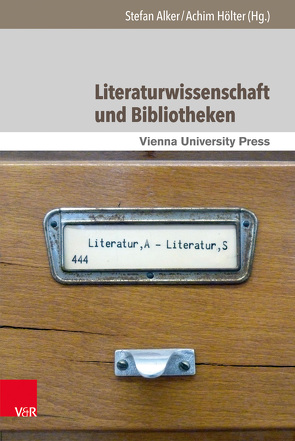
Literaturwissenschaft und Bibliotheken haben ein besonderes Verhältnis zueinander, ist doch die Literaturwissenschaft hauptsächlich in der Bibliothek an der Arbeit. Zugleich war das Nachdenken über Bibliotheken immer wieder von literaturwissenschaftlichen Entwürfen bestimmt. Doch wie sieht das Verhältnis heute aus? Der Sammelband sucht Antworten in Bereichen wie Literatur- und Bibliothekstheorie, Mediologie, literaturwissenschaftlicher Bibliotheksforschung, bibliothekarischer Literaturvermittlung und -versorgung oder der Forschung zu Bibliothekssujets und -metaphern. Mit der Thematisierung von Wissensordnung, Forschungsinfrastrukturen und philologischen Lehrbüchern gerät auch die tägliche Praxis literaturwissenschaftlicher Arbeit als Selbstbeobachtung moderner Geisteswissenschaften in den Blick.
Aktualisiert: 2023-06-28
Autor:
Wolfgang Adam,
Stefan Alker-Windbichler,
Peter Blume,
Andreas Brandtner,
Bernhard Dotzler,
Murray G. Hall,
Achim Hölter,
Michael Pilz,
Markus Stumpf,
Daniel Syrovy,
Dirk Werle
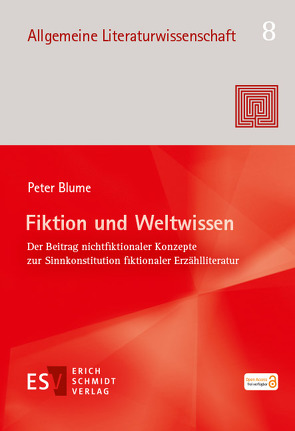
Mit der vorliegenden Studie wird der Versuch unternommen, die Dichotomie von Fiktion und Wirklichkeit aufzugeben zugunsten eines Modells, das dem kognitiven Charakter sprachlicher Bedeutungen Rechnung trägt und es so ermöglicht, der Funktion nichtfiktionaler Konzepte als Orientierungspunkte bei der Sinnkonstitution fiktionaler Erzähltexte gerecht zu werden. Dabei werden Ergebnisse der kognitiven Semantik für die Literaturwissenschaft fruchtbar gemacht, um ein neues theoretisches Fundament zur Differenzierung zwischen fiktionalen und nichtfiktionalen Teilen fiktionaler Erzählliteratur zu schaffen.
Fiction and reality - this dualism has traditionally shaped the debate on fictionality in literary studies. What remains striking, however, is a contradiction between literary theory and the practice of textual analysis. For what is often denied to “realia” for reasons of literary aesthetics, indirectly confirms the practice of interpretation: the importance of non-fictional elements for the understanding of a text.
This study attempts to abandon the dichotomy of fiction and reality in favour of a model that takes into account the cognitive character of linguistic meanings. Thus, the model makes it possible to take account of the function of non-fictional concepts as points of reference in the constitution of meaning in fictional narrative texts. The results of cognitive semantics will be made fruitful for literary studies: a new theoretical foundation is established in order to differentiate between fictional and non-fictional parts of fictional narrative literature.
A Typology of the different ways in which non-fictional elements are used is established, and detailed case studies of texts by authors as diverse as Uwe Johnson, Christoph Ransmayr and Lewis Carroll anchor the theoretical considerations in concrete textual analyses.
Aktualisiert: 2023-06-24
> findR *
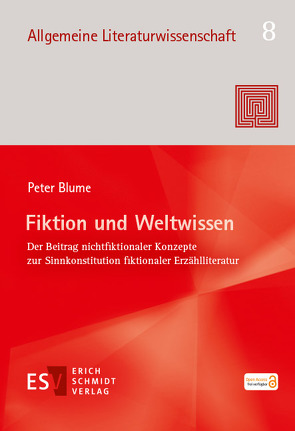
Mit der vorliegenden Studie wird der Versuch unternommen, die Dichotomie von Fiktion und Wirklichkeit aufzugeben zugunsten eines Modells, das dem kognitiven Charakter sprachlicher Bedeutungen Rechnung trägt und es so ermöglicht, der Funktion nichtfiktionaler Konzepte als Orientierungspunkte bei der Sinnkonstitution fiktionaler Erzähltexte gerecht zu werden. Dabei werden Ergebnisse der kognitiven Semantik für die Literaturwissenschaft fruchtbar gemacht, um ein neues theoretisches Fundament zur Differenzierung zwischen fiktionalen und nichtfiktionalen Teilen fiktionaler Erzählliteratur zu schaffen.
Fiction and reality - this dualism has traditionally shaped the debate on fictionality in literary studies. What remains striking, however, is a contradiction between literary theory and the practice of textual analysis. For what is often denied to “realia” for reasons of literary aesthetics, indirectly confirms the practice of interpretation: the importance of non-fictional elements for the understanding of a text.
This study attempts to abandon the dichotomy of fiction and reality in favour of a model that takes into account the cognitive character of linguistic meanings. Thus, the model makes it possible to take account of the function of non-fictional concepts as points of reference in the constitution of meaning in fictional narrative texts. The results of cognitive semantics will be made fruitful for literary studies: a new theoretical foundation is established in order to differentiate between fictional and non-fictional parts of fictional narrative literature.
A Typology of the different ways in which non-fictional elements are used is established, and detailed case studies of texts by authors as diverse as Uwe Johnson, Christoph Ransmayr and Lewis Carroll anchor the theoretical considerations in concrete textual analyses.
Aktualisiert: 2023-06-24
> findR *
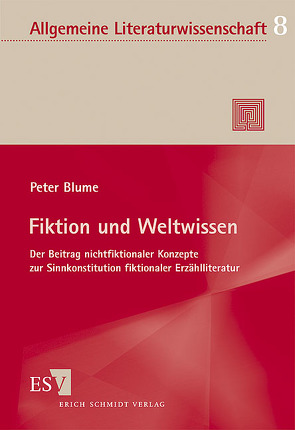
Mit der vorliegenden Studie wird der Versuch unternommen, die Dichotomie von Fiktion und Wirklichkeit aufzugeben zugunsten eines Modells, das dem kognitiven Charakter sprachlicher Bedeutungen Rechnung trägt und es so ermöglicht, der Funktion nichtfiktionaler Konzepte als Orientierungspunkte bei der Sinnkonstitution fiktionaler Erzähltexte gerecht zu werden. Dabei werden Ergebnisse der kognitiven Semantik für die Literaturwissenschaft fruchtbar gemacht, um ein neues theoretisches Fundament zur Differenzierung zwischen fiktionalen und nichtfiktionalen Teilen fiktionaler Erzählliteratur zu schaffen.
Fiction and reality - this dualism has traditionally shaped the debate on fictionality in literary studies. What remains striking, however, is a contradiction between literary theory and the practice of textual analysis. For what is often denied to “realia” for reasons of literary aesthetics, indirectly confirms the practice of interpretation: the importance of non-fictional elements for the understanding of a text.
This study attempts to abandon the dichotomy of fiction and reality in favour of a model that takes into account the cognitive character of linguistic meanings. Thus, the model makes it possible to take account of the function of non-fictional concepts as points of reference in the constitution of meaning in fictional narrative texts. The results of cognitive semantics will be made fruitful for literary studies: a new theoretical foundation is established in order to differentiate between fictional and non-fictional parts of fictional narrative literature.
A Typology of the different ways in which non-fictional elements are used is established, and detailed case studies of texts by authors as diverse as Uwe Johnson, Christoph Ransmayr and Lewis Carroll anchor the theoretical considerations in concrete textual analyses.
Aktualisiert: 2023-06-24
> findR *
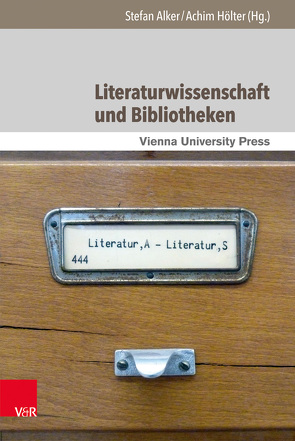
Literaturwissenschaft und Bibliotheken haben ein besonderes Verhältnis zueinander, ist doch die Literaturwissenschaft hauptsächlich in der Bibliothek an der Arbeit. Zugleich war das Nachdenken über Bibliotheken immer wieder von literaturwissenschaftlichen Entwürfen bestimmt. Doch wie sieht das Verhältnis heute aus? Der Sammelband sucht Antworten in Bereichen wie Literatur- und Bibliothekstheorie, Mediologie, literaturwissenschaftlicher Bibliotheksforschung, bibliothekarischer Literaturvermittlung und -versorgung oder der Forschung zu Bibliothekssujets und -metaphern. Mit der Thematisierung von Wissensordnung, Forschungsinfrastrukturen und philologischen Lehrbüchern gerät auch die tägliche Praxis literaturwissenschaftlicher Arbeit als Selbstbeobachtung moderner Geisteswissenschaften in den Blick.
Aktualisiert: 2023-05-28
Autor:
Wolfgang Adam,
Stefan Alker-Windbichler,
Peter Blume,
Andreas Brandtner,
Bernhard Dotzler,
Murray G. Hall,
Achim Hölter,
Michael Pilz,
Markus Stumpf,
Daniel Syrovy,
Dirk Werle
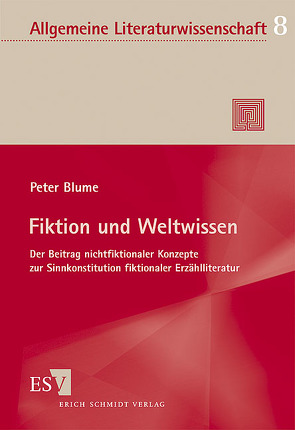
Mit der vorliegenden Studie wird der Versuch unternommen, die Dichotomie von Fiktion und Wirklichkeit aufzugeben zugunsten eines Modells, das dem kognitiven Charakter sprachlicher Bedeutungen Rechnung trägt und es so ermöglicht, der Funktion nichtfiktionaler Konzepte als Orientierungspunkte bei der Sinnkonstitution fiktionaler Erzähltexte gerecht zu werden. Dabei werden Ergebnisse der kognitiven Semantik für die Literaturwissenschaft fruchtbar gemacht, um ein neues theoretisches Fundament zur Differenzierung zwischen fiktionalen und nichtfiktionalen Teilen fiktionaler Erzählliteratur zu schaffen.
Fiction and reality - this dualism has traditionally shaped the debate on fictionality in literary studies. What remains striking, however, is a contradiction between literary theory and the practice of textual analysis. For what is often denied to “realia” for reasons of literary aesthetics, indirectly confirms the practice of interpretation: the importance of non-fictional elements for the understanding of a text.
This study attempts to abandon the dichotomy of fiction and reality in favour of a model that takes into account the cognitive character of linguistic meanings. Thus, the model makes it possible to take account of the function of non-fictional concepts as points of reference in the constitution of meaning in fictional narrative texts. The results of cognitive semantics will be made fruitful for literary studies: a new theoretical foundation is established in order to differentiate between fictional and non-fictional parts of fictional narrative literature.
A Typology of the different ways in which non-fictional elements are used is established, and detailed case studies of texts by authors as diverse as Uwe Johnson, Christoph Ransmayr and Lewis Carroll anchor the theoretical considerations in concrete textual analyses.
Aktualisiert: 2023-05-24
> findR *
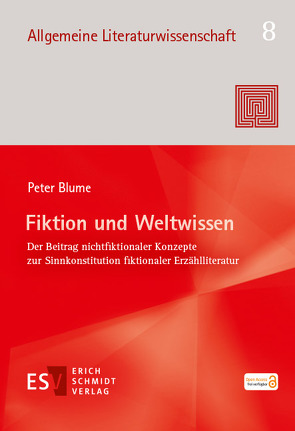
Mit der vorliegenden Studie wird der Versuch unternommen, die Dichotomie von Fiktion und Wirklichkeit aufzugeben zugunsten eines Modells, das dem kognitiven Charakter sprachlicher Bedeutungen Rechnung trägt und es so ermöglicht, der Funktion nichtfiktionaler Konzepte als Orientierungspunkte bei der Sinnkonstitution fiktionaler Erzähltexte gerecht zu werden. Dabei werden Ergebnisse der kognitiven Semantik für die Literaturwissenschaft fruchtbar gemacht, um ein neues theoretisches Fundament zur Differenzierung zwischen fiktionalen und nichtfiktionalen Teilen fiktionaler Erzählliteratur zu schaffen.
Fiction and reality - this dualism has traditionally shaped the debate on fictionality in literary studies. What remains striking, however, is a contradiction between literary theory and the practice of textual analysis. For what is often denied to “realia” for reasons of literary aesthetics, indirectly confirms the practice of interpretation: the importance of non-fictional elements for the understanding of a text.
This study attempts to abandon the dichotomy of fiction and reality in favour of a model that takes into account the cognitive character of linguistic meanings. Thus, the model makes it possible to take account of the function of non-fictional concepts as points of reference in the constitution of meaning in fictional narrative texts. The results of cognitive semantics will be made fruitful for literary studies: a new theoretical foundation is established in order to differentiate between fictional and non-fictional parts of fictional narrative literature.
A Typology of the different ways in which non-fictional elements are used is established, and detailed case studies of texts by authors as diverse as Uwe Johnson, Christoph Ransmayr and Lewis Carroll anchor the theoretical considerations in concrete textual analyses.
Aktualisiert: 2023-05-24
> findR *
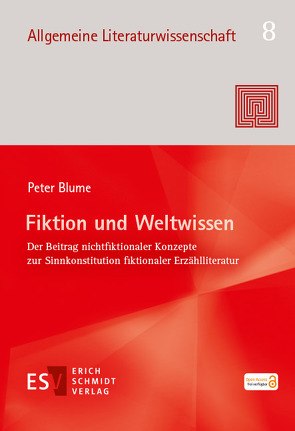
Mit der vorliegenden Studie wird der Versuch unternommen, die Dichotomie von Fiktion und Wirklichkeit aufzugeben zugunsten eines Modells, das dem kognitiven Charakter sprachlicher Bedeutungen Rechnung trägt und es so ermöglicht, der Funktion nichtfiktionaler Konzepte als Orientierungspunkte bei der Sinnkonstitution fiktionaler Erzähltexte gerecht zu werden. Dabei werden Ergebnisse der kognitiven Semantik für die Literaturwissenschaft fruchtbar gemacht, um ein neues theoretisches Fundament zur Differenzierung zwischen fiktionalen und nichtfiktionalen Teilen fiktionaler Erzählliteratur zu schaffen.
Fiction and reality - this dualism has traditionally shaped the debate on fictionality in literary studies. What remains striking, however, is a contradiction between literary theory and the practice of textual analysis. For what is often denied to “realia” for reasons of literary aesthetics, indirectly confirms the practice of interpretation: the importance of non-fictional elements for the understanding of a text.
This study attempts to abandon the dichotomy of fiction and reality in favour of a model that takes into account the cognitive character of linguistic meanings. Thus, the model makes it possible to take account of the function of non-fictional concepts as points of reference in the constitution of meaning in fictional narrative texts. The results of cognitive semantics will be made fruitful for literary studies: a new theoretical foundation is established in order to differentiate between fictional and non-fictional parts of fictional narrative literature.
A Typology of the different ways in which non-fictional elements are used is established, and detailed case studies of texts by authors as diverse as Uwe Johnson, Christoph Ransmayr and Lewis Carroll anchor the theoretical considerations in concrete textual analyses.
Aktualisiert: 2023-04-24
> findR *
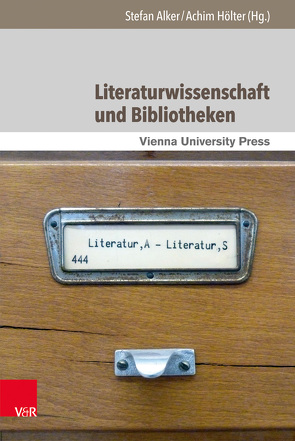
Literaturwissenschaft und Bibliotheken haben ein besonderes Verhältnis zueinander, ist doch die Literaturwissenschaft hauptsächlich in der Bibliothek an der Arbeit. Zugleich war das Nachdenken über Bibliotheken immer wieder von literaturwissenschaftlichen Entwürfen bestimmt. Doch wie sieht das Verhältnis heute aus? Der Sammelband sucht Antworten in Bereichen wie Literatur- und Bibliothekstheorie, Mediologie, literaturwissenschaftlicher Bibliotheksforschung, bibliothekarischer Literaturvermittlung und -versorgung oder der Forschung zu Bibliothekssujets und -metaphern. Mit der Thematisierung von Wissensordnung, Forschungsinfrastrukturen und philologischen Lehrbüchern gerät auch die tägliche Praxis literaturwissenschaftlicher Arbeit als Selbstbeobachtung moderner Geisteswissenschaften in den Blick.
Aktualisiert: 2023-04-28
Autor:
Wolfgang Adam,
Stefan Alker-Windbichler,
Peter Blume,
Andreas Brandtner,
Bernhard Dotzler,
Murray G. Hall,
Achim Hölter,
Michael Pilz,
Markus Stumpf,
Daniel Syrovy,
Dirk Werle
Aktualisiert: 2019-12-30
> findR *
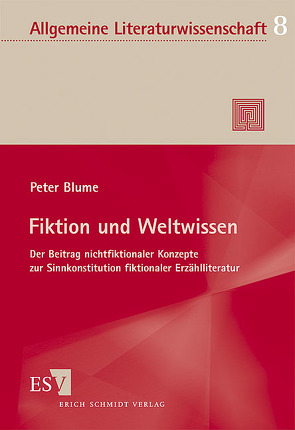
Mit der vorliegenden Studie wird der Versuch unternommen, die Dichotomie von Fiktion und Wirklichkeit aufzugeben zugunsten eines Modells, das dem kognitiven Charakter sprachlicher Bedeutungen Rechnung trägt und es so ermöglicht, der Funktion nichtfiktionaler Konzepte als Orientierungspunkte bei der Sinnkonstitution fiktionaler Erzähltexte gerecht zu werden. Dabei werden Ergebnisse der kognitiven Semantik für die Literaturwissenschaft fruchtbar gemacht, um ein neues theoretisches Fundament zur Differenzierung zwischen fiktionalen und nichtfiktionalen Teilen fiktionaler Erzählliteratur zu schaffen.
Fiction and reality - this dualism has traditionally shaped the debate on fictionality in literary studies. What remains striking, however, is a contradiction between literary theory and the practice of textual analysis. For what is often denied to “realia” for reasons of literary aesthetics, indirectly confirms the practice of interpretation: the importance of non-fictional elements for the understanding of a text.
This study attempts to abandon the dichotomy of fiction and reality in favour of a model that takes into account the cognitive character of linguistic meanings. Thus, the model makes it possible to take account of the function of non-fictional concepts as points of reference in the constitution of meaning in fictional narrative texts. The results of cognitive semantics will be made fruitful for literary studies: a new theoretical foundation is established in order to differentiate between fictional and non-fictional parts of fictional narrative literature.
A Typology of the different ways in which non-fictional elements are used is established, and detailed case studies of texts by authors as diverse as Uwe Johnson, Christoph Ransmayr and Lewis Carroll anchor the theoretical considerations in concrete textual analyses.
Aktualisiert: 2023-04-24
> findR *
MEHR ANZEIGEN
Bücher von Blume, Peter
Sie suchen ein Buch oder Publikation vonBlume, Peter ? Bei Buch findr finden Sie alle Bücher Blume, Peter.
Entdecken Sie neue Bücher oder Klassiker für Sie selbst oder zum Verschenken. Buch findr hat zahlreiche Bücher
von Blume, Peter im Sortiment. Nehmen Sie sich Zeit zum Stöbern und finden Sie das passende Buch oder die
Publiketion für Ihr Lesevergnügen oder Ihr Interessensgebiet. Stöbern Sie durch unser Angebot und finden Sie aus
unserer großen Auswahl das Buch, das Ihnen zusagt. Bei Buch findr finden Sie Romane, Ratgeber, wissenschaftliche und
populärwissenschaftliche Bücher uvm. Bestellen Sie Ihr Buch zu Ihrem Thema einfach online und lassen Sie es sich
bequem nach Hause schicken. Wir wünschen Ihnen schöne und entspannte Lesemomente mit Ihrem Buch
von Blume, Peter .
Blume, Peter - Große Auswahl an Publikationen bei Buch findr
Bei uns finden Sie Bücher aller beliebter Autoren, Neuerscheinungen, Bestseller genauso wie alte Schätze. Bücher
von Blume, Peter die Ihre Fantasie anregen und Bücher, die Sie weiterbilden und Ihnen wissenschaftliche Fakten
vermitteln. Ganz nach Ihrem Geschmack ist das passende Buch für Sie dabei. Finden Sie eine große Auswahl Bücher
verschiedenster Genres, Verlage, Schlagworte Genre bei Buchfindr:
Unser Repertoire umfasst Bücher von
Sie haben viele Möglichkeiten bei Buch findr die passenden Bücher für Ihr Lesevergnügen zu entdecken. Nutzen Sie
unsere Suchfunktionen, um zu stöbern und für Sie interessante Bücher in den unterschiedlichen Genres und Kategorien
zu finden. Neben Büchern von Blume, Peter und Büchern aus verschiedenen Kategorien finden Sie schnell und
einfach auch eine Auflistung thematisch passender Publikationen. Probieren Sie es aus, legen Sie jetzt los! Ihrem
Lesevergnügen steht nichts im Wege. Nutzen Sie die Vorteile Ihre Bücher online zu kaufen und bekommen Sie die
bestellten Bücher schnell und bequem zugestellt. Nehmen Sie sich die Zeit, online die Bücher Ihrer Wahl anzulesen,
Buchempfehlungen und Rezensionen zu studieren, Informationen zu Autoren zu lesen. Viel Spaß beim Lesen wünscht Ihnen
das Team von Buchfindr.










